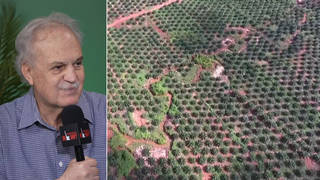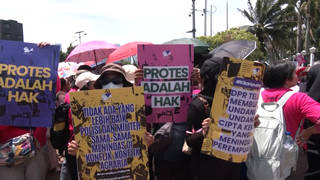
Topics
The death toll from a weekend earthquake in Indonesia has topped 5,400. More than 20,000 people were injured in the disaster and as many as 200,000 people have been left homeless, many without shelter or food. We go to Java to speak with an officer with the United Nations Children’s Fund. [includes rush transcript]
The death toll from a weekend earthquake in Indonesia has topped 5,400. More than 20,000 people were injured in the disaster and as many as 200,000 people have been left homeless, many without shelter or food.
The 6.3 magnitude earthquake struck at dawn on Saturday near the ancient city of Yogyakarta in central Java. President Susilo Bambang Yudhoyono predicted it would take three months to provide the displaced and injured with basic shelter and medical equipment and regular food supplies. He has temporarily moved his office to Yogyakarta.
Emergency aid has begun to trickle in after heavy rain and a series of aftershocks initially hampered relief operations. United Nations officials say more than 22 countries have responded to Indonesia”s call for help with aid or pledges of assistance.
Among the aid pledged from abroad was $2.5 million dollars from the United States and $3.8 billion dollars from the European Union.
- Kendartanti Subroto, officer with the United Nations Children’s Fund. She joins us on the line from Java.
Transcript
AMY GOODMAN: We’re going to turn now to Kendartanti Subroto, officer with the United Nations Children’s Fund, with UNICEF. We welcome you to Democracy Now! Can you tell us the situation on the ground?
KENDARTANTI SUBROTO: The situation on the ground now is getting better. [inaudible] distribution of supplies. Many relief workers have managed to reach even the most difficult areas in Central Java, as well as the province of Yogyakarta. So UNICEF, for example, today we managed to get our supplies benefiting about 80,000 people, and they include personal hygiene kits, water, drinking water, as well as [inaudible] equipment. And one children’s center today has been opened for the children in the district of Bantul of Yogyakarta.
AMY GOODMAN: What is the greatest need people have right now in Yogyakarta?
KENDARTANTI SUBROTO: People now are in need of sanitation facilities, because there are many people living in camps, in the internal displaced people camps, and also in hospitals. Hospitals can no longer accommodate patients inside the building. So [inaudible] needed for these people, as well as fans, because so many people now live outside their houses, and the quality of fans is not that good.
AMY GOODMAN: Kendartanti Subroto, I want to thank you for joining us from Java, a UNICEF officer there.












Media Options